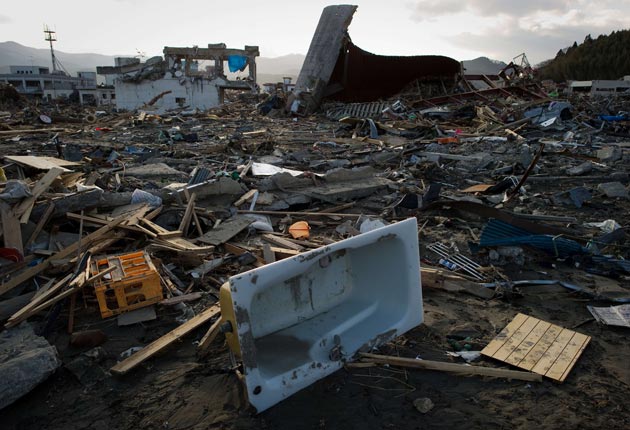'I've lost my wife, but I'm no worse off than others'
The fishing town of Rikuzen-Takata was flattened by the tsunami. David McNeill meets townspeople struggling to rebuild their lives

Mitsuhide Kanno is standing on a pile of muddy firewood where his home used to be. The 36-year-old has come to salvage what he can and found a single object: a hibachi, a traditional Japanese charcoal heater. "We could only locate the house because of this," he says, pointing at an old green water pump still clinging stubbornly to solid ground. The small family car is 200 metres away, upside down, across the ruined landscape of Rikuzen-Takata.
A few days ago, Mr Kanno gave up the search for his 68-year-old father, Ken. "We think he was in his car, trying to reach relatives when the tsunami came," he says. His mother went to the makeshift morgue to identify the bloated, partly decomposed body of her husband, but police showed her the wrong corpse. "She was terribly upset."
Rikuzen-Takata was once a picturesque fishing town boasting a 900-year-old festival of floats and a coastline bathed in the azure-blue Pacific waters. Today it exists only in name. The quake and muddy deluge tore the town from its roots, leaving smashed cars, pulverised wooden houses and twisted metal girders.
Across the town, and up and down Japan's ruined north-east coast, families such as the Kannos are sifting through the wreckage of their lives. The human suffering is almost overwhelming: 27,600 people dead or missing and perhaps 300,000 left homeless.
Of the roughly 23,000 people who lived in this town before the Pacific plates shifted on 11 March, 2,400 are dead or presumed so, says Mayor Fotoshi Toba, who surveys the ruins from his makeshift offices on a hill above the town. Among the missing is his wife. "I'm human too, a husband and a father of two," he says, rubbing a hand over his unshaven face. "Of course it's difficult. I've asked myself if I shouldn't be out searching for my wife. But I'm no worse off than many of the people around me and sometimes better off. Everybody is putting their own feelings aside and working for us so I must do the same. We have one man here, a fireman, who lost his two children, his father, mother and wife."
About 400 of Rikuzen-Takata's homeless can be found in the Daiichi Junior High School a few hundred metres from Mr Toda's office. The refugees have divided up the school's huge gymnasium into blocks replicating their old neighbourhoods.
Many are bereaved and few have the insurance to rebuild their homes. "I lost my mother, father and younger brother," says Yurie Sasaki, her face wet from crying. Her teenage daughter sits beside her, eyes cast downwards. "Everything is so dark right now. We don't know where we're going to live, or if the prefecture [government] will help us. Families are going have to support each other financially, but ours has no money." Adults will move in with parents or grandparents, if they still have them.
After millennia of quakes and tsunamis the fear of what the ocean can bring runs deep among people in fishing towns all along the north-east. Thick reinforced concrete walls dot the coastline. "We thought we were safe," says Kenji Nakajima, a fisherman, standing on the rubble of his home in the village of Sakihama, 30 minute's drive from Rikuzen-Takata. Behind him is a 10-metre high wall, blocking the sea. "I couldn't believe it when I saw the water coming over the barrier. It was 15 or 20 metres high. I ran for my life." His wife Miwa stops sifting through the rubble to lift her head. "Another tsunami will come in 50 or 60 years. We'll be dead but our son will be alive. I'm not coming back here."
Over 3,600 buildings in Rikuzen-Takata were swept into the sea, including many apartment blocks; about half the rest are partially or irreparably damaged, leaving over a third of the townspeople homeless. In front of the school, 200 temporary 30-square-metre homes are already almost built, the first of 40,000 all across the three hardest-hit prefectures of Miyagi, Fukushima and Iwate. The agonising decision as to who will get this scarce resource has already begun. The elderly, the physically disabled and women with children will be allocated the first half batch of houses, the rest will be chosen by lottery. Some pensioners may have to wait for months. "I'm by myself, so I imagine I'll be last in line," frets Tami Konno, 75, who has no children. Even mothers face rationing. Mrs Sasaki will be low on the list because her children are older, she predicts. "But everyone is suffering now so I understand."
Join our commenting forum
Join thought-provoking conversations, follow other Independent readers and see their replies
Comments
Bookmark popover
Removed from bookmarks